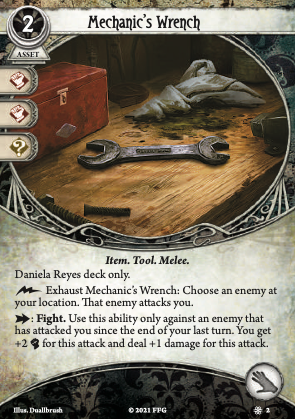
Notably, Mechanic's Wrench does NOT have the Weapon trait, so no finding it with Prepared for the Worst/enchanting it/etc.
200characters200characters200characters200characters200characters200characters

Notably, Mechanic's Wrench does NOT have the Weapon trait, so no finding it with Prepared for the Worst/enchanting it/etc.
200characters200characters200characters200characters200characters200characters
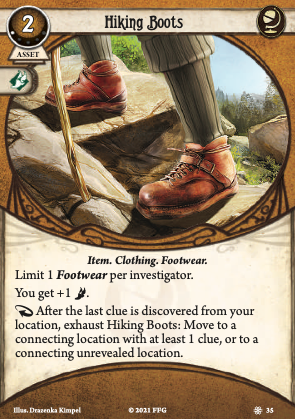
This card's movement ability looks very good at first glance, but it can be surprisingly hard to get value from. Naturally, it depends on the level structure and so on, but some entire campaigns have a lot of levels where it's surprisingly hard to get use out of.
For example, a level like Echoes of the Past has a strip of (mostly) clueless locations across the middle, with clue-filled locations to each side of them. So you can't get rid of the no clues in the middle to move to the unrevealed or clued locations, and once you get rid of the clues on those locations you realise you can't move back to the now-revealed locations without clues either. Barring some shenanigans with Mr. Peabody, this makes it very hard to get even a single move from the shoes across the entire scenario. This is an extreme case, but can expand out to a lot of the campaign. The Last King is similar in its map that needs to be moved through a lot that begins with almost no clues. For The Unspeakable Oath, they're unlikely to help with the necessary back-tracking in that level, unless you leave clues behind, in which case they didn't give you any mobility early - this is their main problem in any level that does require back-tracking, which most of the rest of Carcosa does. In Dim Carcosa the has the unfortunate effect of not leaving a window to flip your location after you drain it of clues, so you either need to leave a friend there, or, in solo, go back there anyway, negating the actual advantage to the move.
Similarly, The Forgotten Age and its explore mechanic mean you will usually move due to the explore, often after getting the clues from the location you're on to begin with - something that's necessitated in a couple of the levels. On those levels, it's very hard to get movement from at all. On the others, it means exploring early and leaving clues scattered is a more viable strategy, and it does open up the board more which can be good. Or bad, sometimes.
Of course, there are plenty of levels where the shoes aren't really hard to get value from at all. I do think they work a lot better on the expansive maps of Innsmouth, for example. But I was very surprised at how limiting the move's requirements could really be, and just wanted to point that out.
So over all, I think the movement ability itself is less consistent than even the test on Track Shoes, and certainly isn't the Pathfinder replacement I initially thought it might be. That said, it has its upsides. Having the item trait means it interacts with a number of abilities, including William Webb, can easily be traded around, or discounted. It also gives a stat upgrade, which is certainly significant, and probably worth a slot for anyone who actually wants to make use of . It's build-depenant of course, but the people who most likely want to use that stat are the people who also like either movement or to leave clues scattered around the map, Ursula Downs, Monterey Jack and Trish Scarborough, who it was the obvious fit for anyway.
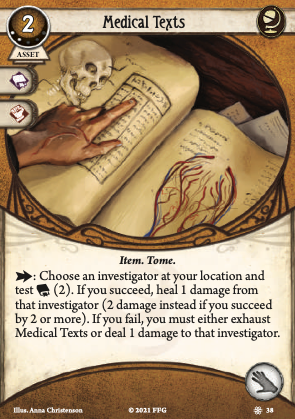
Healing or specifically getting soak out for its own sake tends to be anti-tempo and thus is relegated to investigators who can get special benefits (ex: Carolyn, Tommy), who desperately need extra effective health (Mark), or who can do special things to make it more efficient (Yorick). And maybe if you don't have anything better to do early campaign (say... Sister Mary in a 4 player game where she is sitting fairly hard in support).
However EOTE is amping up how good healing gets, and we are starting to get 'conditional' efficient heals that are worth using for their own sake to let decks run a bit more 'hot' on damage.
This is not one of them.
Firstly, on standard difficulty, you need to get to 6 lore on non-investigate lore tests to have good odds of actually healing 2. Otherwise this is just as inefficient in most characters as First Aid, probably the shining example of 'holy crud healing is generally bad in Arkham!'
6 investigate isn't too hard in pure seeker, but it isn't trivial either: you can do it, but seekers have a lot of ways to boost lore actively now and if your actively boosting lore to power this, it becomes more expensive and thus less action efficient. So this wants to be in a passive lore booster setup. That isn't too big a hurdle, but it should be noted your looking at spending XP on stuff like Death and not stuff like Higher Education.
Secondly, it is slow. A 'good' heal or soak card will heal something like 3 health in 1 card, 3 resources, 1 action, or just heal you 2 at the cost of only a card and an action. This card is healing you 2 HP for 2 resources, a card, and two actions, which is extremely expensive, but every heal after that becomes a 'good' heal assuming you always hit the mark. But that 1 action 2 resource tax is generally worth about 2 actions, meaning you need to heal with this 3 times for 2 HP to really make use of it as a healing effect at an efficient level, which isn't really ideal when you compare this to something like Earthly Serenity which is also a somewhat action intense heal that just lets you rocket up someone to 4 in 2 actions, instead of 3. Unless your healing a truly insane amount of HP, you generally won't heal enough to get more value out of this than the 'burst' healing or good soak assets that exist.
The main value of this card is that it is infinite healing. This isn't generally high value, but there are some things you can do with it. For example, with a guardian ally, this lets you convert a very simple lore test into 2 actionless damage with Beat Cop or 2 clues with Grete. A very basic lore test to 'bank' two clues in the future isn't terrible, especially if you are Daisy, because it lets you eat up 'in between' turns setting up allies, but this is still fairly questionable at this time. As we see more 'ally pain' engines, we might see this become a good way to support those allies, but for now its just really way too slow, even though it is basically a straight upgrade on first aid in the right deck.
Now obviously you can run it in 'actionless book' strategies like Daisy or Abigail but this doesn't make the actions really free: opportunity cost is a thing, and you almost always can be doing better stuff both with your free book actions, and with the action and resources it takes to draw and play the book, than gain some HP over a few turns, unless the scenario REALLY is trying to grind away at your team purely through HP damage to the point your literally struggling to survive without gaining 6+ HP a scenario, which is... unlikely.
Until seekers have good options to turn health into some sort of tempo advantage like guardians (and some rare mystics) can, this just doesn't make a ton of sense to run. While we may be seeing more healing from Arkham, Seeker is gunna have to keep its greedy little paws off yet another very broad design space and let the Survivors, Guardians, and Mystics have their fun.
But do keep an eye on this card, especially if our good friend Vincent Lee shows up some day. It is bad in the context of what it is good at being unnecessary right now. Not in the sense it isn't good at what it does.
EDIT: Curses, foiled again! This can't heal allies, relegating it pretty hard towards just being a good tool for you to 'pocket' a Mark with if you want to give them +2 to two tests and a card every round for an action, which can stack with encyclopedia. Not exactly terrible functionality, but this is still extremely niche without further 'pain on investigator' or 'reward for healing' support.
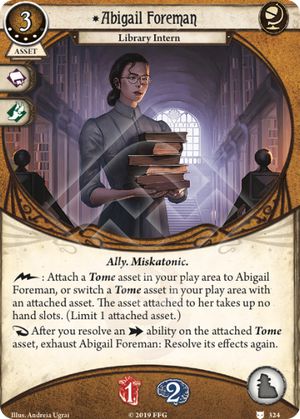
A few more cycles have been released now, so what other Tomes should Abigail Foreman be holding for you?
That's it so far with the Player Cards as of Edge of the Earth. Let's see what we get next!
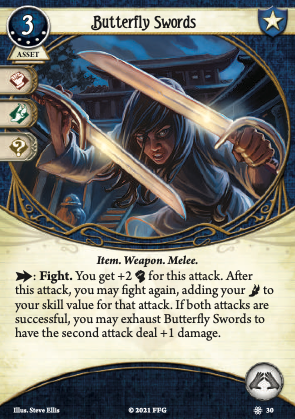
The level 5 Butterfly Swords are far more capable weapons than their lower level sibling. But as one of the most expensive weapons in the game (in terms of Xp), they better be. Let's have a closer look.
TL;DR There are two things I like about the Butterfly Swords. 1) You can deal 3 damage with your first activation each round, as long as you pass both tests. 2) you can upgrade them from level 2. Everything else are either mediocre or bad. The swords are hard sells at 5 Xp, and I would advice you to buy Cyclopean Hammers instead.
Maybe someday we'll get a card effect that will add +1 damage to each attack made that round - or something like that . That might make the swords worth your time.